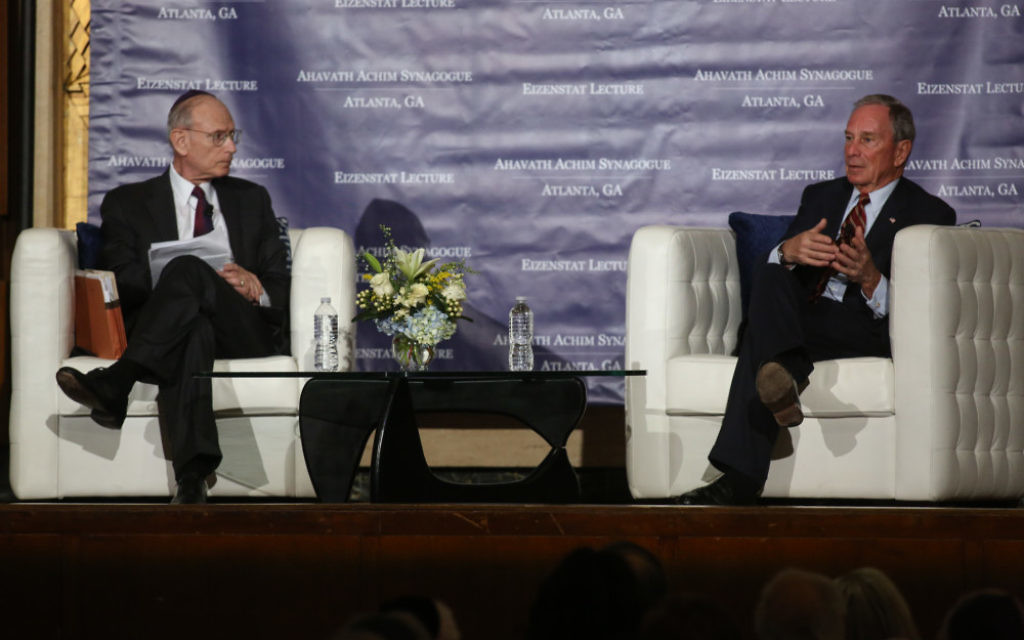Bloomberg’s Philanthropy Extends to Politics


Former New York Mayor Michael Bloomberg had people in every state ready to support his potential presidential bid in March, but even though the public wanted someone genuine, the “real megillah,” as a candidate, the billionaire chose not to run because all polling showed that it was impossible to receive even half the vote.
Instead, Bloomberg told the capacity crowd at Ahavath Achim Synagogue on Tuesday night, July 19, for the 28th Fran Eizenstat and Eizenstat Family Annual Lecture, the best he could do was prevent either Republican Donald Trump or Democrat Hillary Clinton from winning an electoral majority and force the decision into the U.S. House in January. He decided that outcome wasn’t good for the country.

Unlike previous Eizenstat lecturers, from Elie Wiesel to Bill and Hillary Clinton to last year’s speaker, Vice President Joe Biden, the three-term New York mayor, philanthropist and entrepreneur didn’t deliver a prepared speech. Instead, he had a conversation with the lecture’s sponsor and host, Ambassador Stuart Eizenstat.
Get The AJT Newsletter by email and never miss our top stories Free Sign Up
Born in Massachusetts to a working-class Jewish family, Bloomberg is one of the 10 wealthiest people in the world, with an estimated net worth of $47 billion. In 1981 he founded the business media group Bloomberg L.P., which currently employs nearly 2,000 people in 73 countries. After serving as mayor from 2001 to 2013, he has focused on philanthropy, supporting public health, arts and culture, the environment, and education. He also is the U.N. secretary-general’s special envoy for cities and climate change.
Although he was a Republican when he served as mayor, Bloomberg is now an independent seen as too liberal for most Republicans and was expected to endorse Clinton at the Democratic National Convention.
In welcoming the crowd to his synagogue and the lecture, Rabbi Neil Sandler asked for a moment of silence before delivering a d’var Torah about gun violence and political intolerance. Offering an anecdote from Talmudic Rabbis Hillel and Shammai, Rabbi Sandler said that though they argued passionately, they respected each other, as we should do today.
Atlanta Mayor Kasim Reed also spoke before the wide-ranging Bloomberg-Eizenstat conversation. He spoke about Bloomberg’s professional and philanthropic contributions and called this “very special man” a “friend and mentor.”
Asked about values to start the discussion, Bloomberg, 74, said his hardworking parents donated to the NAACP when he was a boy. When his father was asked why he gave to the African-American organization, he replied, “Because discrimination against anybody is discrimination against everybody.”
Still, Bloomberg took a swipe at millennials, drawing applause from the largely over-50 crowd. He said America’s youngest and largest working generation is “too coddled,” and he added, “On micro-aggressions, yeah, they’re micro.”
Even though college graduates are entering the workforce with more debt than ever, Bloomberg advised that prospective employees “should not take the jobs that will pay you the most, but what will teach you the most.”
He said he learned many ethics and important guidelines in his business career, especially during his stint at Salomon Brothers, and he has tried to replicate those good practices. “My job as a manager is to have people work together and to give recognition and respect.”
Such principles often have been more important than experience for Bloomberg, who founded Bloomberg News with no media background and was elected mayor in his first political campaign.

Bloomberg cited successes in his 12 years as mayor in the aftermath of 9/11: Crime fell by nearly one-third, pollution and carbon emissions decreased, and the quality of public education increased.
He said there will always be a few rotten apples in the 35,000-strong New York Police Department, but the force succeeds overall largely because its ethnic and religious diversity mirrors the city’s population.
In his philanthropy, Bloomberg has given billions of dollars to programs such as anti-smoking initiatives, gun control, maternal health, traffic safety and the environment.
“Climate change is real,” he said, scoffing at unnamed members of Congress, mostly from his own party, for denying its existence and its long-term effects.
Turning to “contemporary political issues,” Bloomberg said that though we live in the “age of terrorism,” an American is more likely to be struck by lightning than to be injured in a terrorist attack.
He said Syria is experiencing genocide, and he indicated that the United States and other wealthy countries should act more altruistically and practically in dealing with the millions of refugees from Syria and its neighbors.
To round out the conversation, Eizenstat reminded Bloomberg that Atlanta is home to Coca-Cola’s headquarters. Bloomberg rose to the challenge.
“Yep. Obesity will kill more people than smoking in the next 100 years. This is why” he ordered a ban on the sale of sodas and other sugary beverages larger than 16 ounces (an action a New York appellate court decided was unconstitutional).




comments